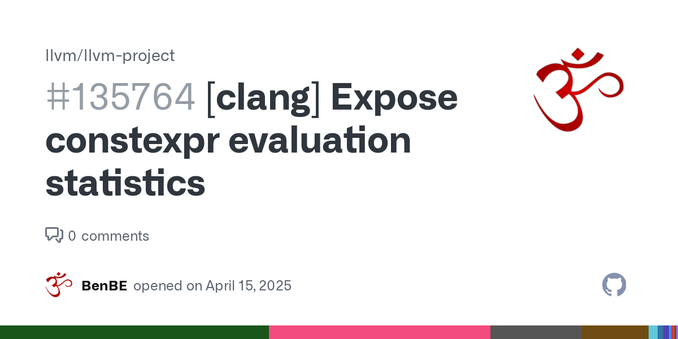Apparently, #C++ developers are so smitten with `constexpr` that they're willing to sacrifice their first-born to it in #C++26. Gone are the days of simple "Hello, World" — now it's all about wrangling `constexpr` lambdas while hoping the compiler gods smile upon you.
https://www.sandordargo.com/blog/2025/04/23/cpp26-constexpr-language-changes #constexpr #programming #humor #developercommunity #HackerNews #ngated
Recent searches
Search options
#constexpr
C++26: more constexpr in the core language
https://www.sandordargo.com/blog/2025/04/23/cpp26-constexpr-language-changes
#HackerNews #C++ #C++26 #constexpr #programming #language #changes #tech #news
Okay, let's see how long it takes for this feature to get implemented in clang …

C++Now 2025 SESSION ANNOUNCEMENT: Harnessing constexpr - A Path to Safer C++ by Mikhail Svetkin
https://schedule.cppnow.org/session/2025/harnessing-constexpr/
Register now at https://cppnow.org/registration/
C++26 — встреча ISO в Хагенберге
В середине февраля в Хагенберге состоялась встреча международного комитета по стандартизации языка программирования C++. В этот раз прорабатывались следующие большие темы: std::hive Constexpr, ещё больше constexpr Безопасность, контракты, hardening, профили, UB и std::launder Relocate #embed Об этом и других новинках расскажу в посте
https://habr.com/ru/companies/yandex/articles/882518/
#c++29 #с++29 #c++26 #с++26 #с++ #c++ #reflection #constexpr #exception #simd #safety #security #undefined_behavior #memory #byte #bit #contracts #relocation #hive #object_pool #embed
ISO C++ — встреча международного комитета в Польше
В конце ноября состоялась встреча международного комитета по стандартизации языка программирования C++. В этот раз без внимания не остались темы: Рефлексия времени компиляции и оператор «монобровь» Constexpr, много constexpr SIMD Structured bindings as a pack Безопасность, контракты, libc++ hardening, профили, UB и std::launder Сколько бит в байте? Об этом и других новинках расскажу в посте
https://habr.com/ru/companies/yandex/articles/860308/
#c++26 #с++26 #с++ #c++ #reflection #constexpr #consteval #exception #simd #safety #security #undefined_behavior #memory #byte #bit
We have just released a new C++OnSea 2024 Conference Video!
Understanding The constexpr 2-Step – by @lefticus – C++ on Sea 2024
Type Loopholes: решая нерешаемое. Рефлексия времени компиляции
Лупхолы — это техника, позволяющая манипулировать глобальным состоянием компилятора, добавляя значения и считывая их. Эта техника позволяет решать многие задачи, некоторые из которых будут рассмотрены в статье: Узнать, какие параметры принимает конструктор типа. Узнать, с какими шаблонными параметрами вызывался метод/функция с ADL. Как сделать метапрограммирование с типами более похожим на обычный код, где есть состояние.
C++OnSea 2024 SESSION ANNOUNCEMENT: Introduction to SWAR (SIMD Within A Register) - The Next Performance Frontier You Haven’t Heard Of! by Jamie Pond
Register now at https://cpponsea.uk/tickets/
C++OnSea 2024 SESSION ANNOUNCEMENT: Understanding The constexpr 2-Step: From Compile Time To Run Time by @lefticus
https://cpponsea.uk/2024/sessions/understanding-the-constexpr-2-step-from-compile-time-to-run-time
Register now at https://cpponsea.uk/tickets/
C++OnSea 2024 SESSION ANNOUNCEMENT: Introduction to SWAR (SIMD Within A Register) - The Next Performance Frontier You Haven’t Heard Of! by Jamie Pond
Register now at https://cpponsea.uk/tickets/
C++OnSea 2024 SESSION ANNOUNCEMENT: How and When To Write a Template by Roth Michaels
https://cpponsea.uk/2024/sessions/how-and-when-to-write-a-template
Register now at https://cpponsea.uk/tickets/
C++OnSea 2024 SESSION ANNOUNCEMENT: Introduction to SWAR (SIMD Within A Register) - The Next Performance Frontier You Haven’t Heard Of! by Jamie Pond
Register now at https://cpponsea.uk/tickets/
We have released a new CppCon 2023 Video!
Lightning Talk: Making Friends With CUDA Programmers (please constexpr all the things) Vasu Agrawal
https://youtu.be/TRQWxkRdPUI
#constexpr #CUDA #Embedded #GPU #GraphicsImages #HowTo #Libraries
C++OnSea 2024 SESSION ANNOUNCEMENT: Understanding The constexpr 2-Step: From Compile Time To Run Time by @lefticus
https://cpponsea.uk/2024/sessions/understanding-the-constexpr-2-step-from-compile-time-to-run-time
Register now at https://cpponsea.uk/tickets/
C++OnSea 2024 SESSION ANNOUNCEMENT: How and When To Write a Template by Roth Michaels
https://cpponsea.uk/2024/sessions/how-and-when-to-write-a-template
Register now at https://cpponsea.uk/tickets/
CppNow 2024 Session Announcement
<Random> harder better faster stronger by Adrien Devresse
https://schedule.cppnow.org/session/random-harder-better-faster-stronger/
Register today at cppnow.org/registration
C++26 — прогресс и новинки от ISO C++
Работа в комитете по стандартизации языка C++ активно кипит. Недавно состоялось очередное заседание. Как один из участников, поделюсь сегодня с Хабром свежими новостями и описанием изменений, которые планируются в С++26. До нового стандарта C++ остаётся чуть больше года, и вот некоторые новинки, которые попали в черновик стандарта за последние две встречи: запрет возврата из функции ссылок на временное значение, [[indeterminate]] и уменьшение количества Undefined Behavior, диагностика при =delete; , арифметика насыщения, линейная алгебра (да-да! BLAS и немного LAPACK), индексирование variadic-параметров и шаблонов ...[42] , вменяемый assert(...) , и другие приятные мелочи. Помимо этого, вас ждут планы и прогресс комитета по большим фичам и многое другое. Рассмотрим новинки на примерах
https://habr.com/ru/companies/yandex/articles/801115/
#c++ #с++ #constexpr #c++26 #с++26 #numeric #floating_point #float #double #iso #программирование #span #functions #function #blas #lapack #atomic #linear_algebra #variadic_templates
Компиляция на этапе выполнения в C++: constexpr, consteval и constinit
Сегодня мы поговорим о том, как constexpr , consteval , и constinit позволяют реализовывать компиляцию на этапе выполнения. Компиляция на этапе выполнения позволяет ускорить выполнение кода за счет выполнения расчетов на этапе компиляции, а не в рантайме. constexpr делает возможным вычисление значений переменных во время компиляции. Функции и переменные, объявленные с этим ключевым словом, могут быть вычислены на этапе компиляции consteval усиливает концепцию constexpr , требуя обязательного вычисления выражений во время компиляции. constinit используется для инициализации статических и глобальных переменных. А теперь подробней.
@talios @myfear Java already automatically does some of the #optimizations that #constexpr would enable (the OP mentions "Compile-time constant folding").
#ProjectLeyden seems to provide a framework for defining #condensers more easily. Perhaps a library can provide an `@ConstExpr` annotation alongside a #compiler plugin to do exactly what you would expect coming from a C++ background -- such as warn you when your expression isn't actually a compile time constant.

